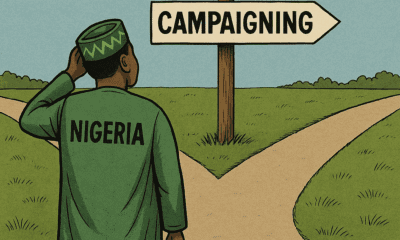Global Issues
Migrants Day: Propelling a New Globalization Agenda -By Abdu Abdullahi
On a final note, the crisis of migration is both accidentally universal and endless. However, what is paramount is complying with the theme for last year, migrants contributions to their host countries need to be recognised, re-assessed, intensified and consolidated as a mark of recognition for safeguarding their rights as human beings, fostering another item of globalisation focus.
On December 18,2024, the world witnessed and celebrated the International Migrants Day. The reflective and vibrant theme was “Honouring the Contributions of Migrants and Respecting their Rights”.
Migrants Day is for sober reflections on the people who are forced to leave their countries to stay in other countries. It is the day the United Nations dedicates to the victims of devastating natural disasters, political and economic crisis, violence and persecution among others, deeply mesmerising on their new identity found in strange environments. Migrants huge cost of exodus corroborates with their insatiable passion for self-actualisation and fulfilment.
For centuries, people have migrated from one country to another, culminating in humongous casualties. Reliable statistics have shown that nearly 70,000 migrants have died or gone missing along land and sea routes since 2014. In 2023, over 8500 deaths were recorded, the highest annual death toll. Probably, the actual number may be greater. But for each dead person, it is a distressful representation of a great loss that affects a family, reverberating throughout communities and societies. This calls for global concerns not only through presentation of frightening figures, but more importantly, rising up to the phenomenal challenges bordering on migrants.
The global movement of people from one country to another is increasingly occurring. It is a practical way of interpreting our complex and changing world. Though the option of leaving home is evidently a dangerous and fatal adventure, yet it is often a compelling force for a more dignified living. Despite political concerns and media surveillance about their phenomenal rise, migrants continue to witness escalating higher rate of deaths. According to the United Nations, around 281 million people representing 3.6% of the global population are international migrants. This number is more than the population of Nigeria. Therefore, globalisation must be an inclusive home to the new nation of emigrants.
In the Eastern Mediterranean Region, Sudan and the occupied Palestine, the grip of devastating conflicts has degenerated into the involuntary motive to flee home for safety elsewhere. While more than 14 million Sudanese have been forced to flee their homes for safety, almost the entire population of the Gaza Strip has been displaced, multiple times. Yemen is in the throes of a protracted emergency and faces a growing number of extreme weather events.
In Africa, almost half of the population has considered emigrating. The Afrobarometer, a pan-African, non partisan survey research network providing reliable data on African experiences and evaluation of democracy, governance and quality life survey shows that the primary motivating factors are to find jobs and escape economic hardships. North America and Europe are the most preferred destinations of Africans, though a significant proportion of potential migrants would prefer to relocate within Africa.
For Africa’s future, this report is disturbing. How are we going to escape from this conundrum? The late Nkwame Nkrumah provided a survival template thus: ‘Africa needs a new type of citizen’. Indeed, the new African citizenship is a noble, collective and revolutionary mechanism that aligns with our cultural power and invaluable values of progress and development. To augment this, the late Julius Nyerere emphasised that Africans cannot be developed by others, but can only develop themselves by collective and patriotic participation in the affairs of their countries to forge ahead and weather the storm.
Indeed, the quest for safety or higher aspirations by migrants often leads to mental health challenges. Overwhelmed by events beyond their control, migrants end up disrupting their livelihoods and communities, experiencing extreme fear, grief, uncertainty and helplessness. Migrants also stand the risk of being stigmatized, discriminated and subjected to violence and harassment by the host population, undermining their sense of belonging and cultural identity among others. These are the unequivocal implications addressed by the theme of last year’s event on migrants.
While according humane solidarity for migrants, the General Assembly of the United Nations through its Secretary General third person report on Global Compact for Migration ( GCM) calls for providing humanitarian support and assistance for migrants in distress, strengthening cooperation on missing migrants, including concrete proposals to prevent migrants from dying or going missing, enhancing search and identification efforts, supporting affected families, providing justice, accountability and redress, collecting data on migrant deaths and disappearance and sharing migration forecasting data to optimize humanitarian assistance.
Honouring the migrants and respecting their rights can be an crafty innovation of globalisation process, building a strong base for humanity. Migrants are products of humanitarian, political and economic crisis, products of power failures. Although the impromptu process of migration is creating new fear in new environments, global efforts should be exerted, allowing the striving of a new cultural identity, connecting with other people from other parts of the world for survival, improving life and preservation of self-esteem. It is an inevitable quest for the survival of humanity regardless of an emigrant’s origin.
Apart from playing critical roles in labour markets, filling skills gaps, driving innovations and entrepreneurship as well addressing demographic challenges in aging societies, migrants also boost economic growth and provide a lifetime to families and communities back home, bolstering their caring. These contributions they make in the wake of stigmatism perpetrated by some host countries. Largely drawn from underdeveloped countries, migrants find a new life in developed countries of especially Europe and America where they will rather allow failure to kill their dreams instead of giving doubt the chance to do that.
On a final note, the crisis of migration is both accidentally universal and endless. However, what is paramount is complying with the theme for last year, migrants contributions to their host countries need to be recognised, re-assessed, intensified and consolidated as a mark of recognition for safeguarding their rights as human beings, fostering another item of globalisation focus.
Continue Reading










